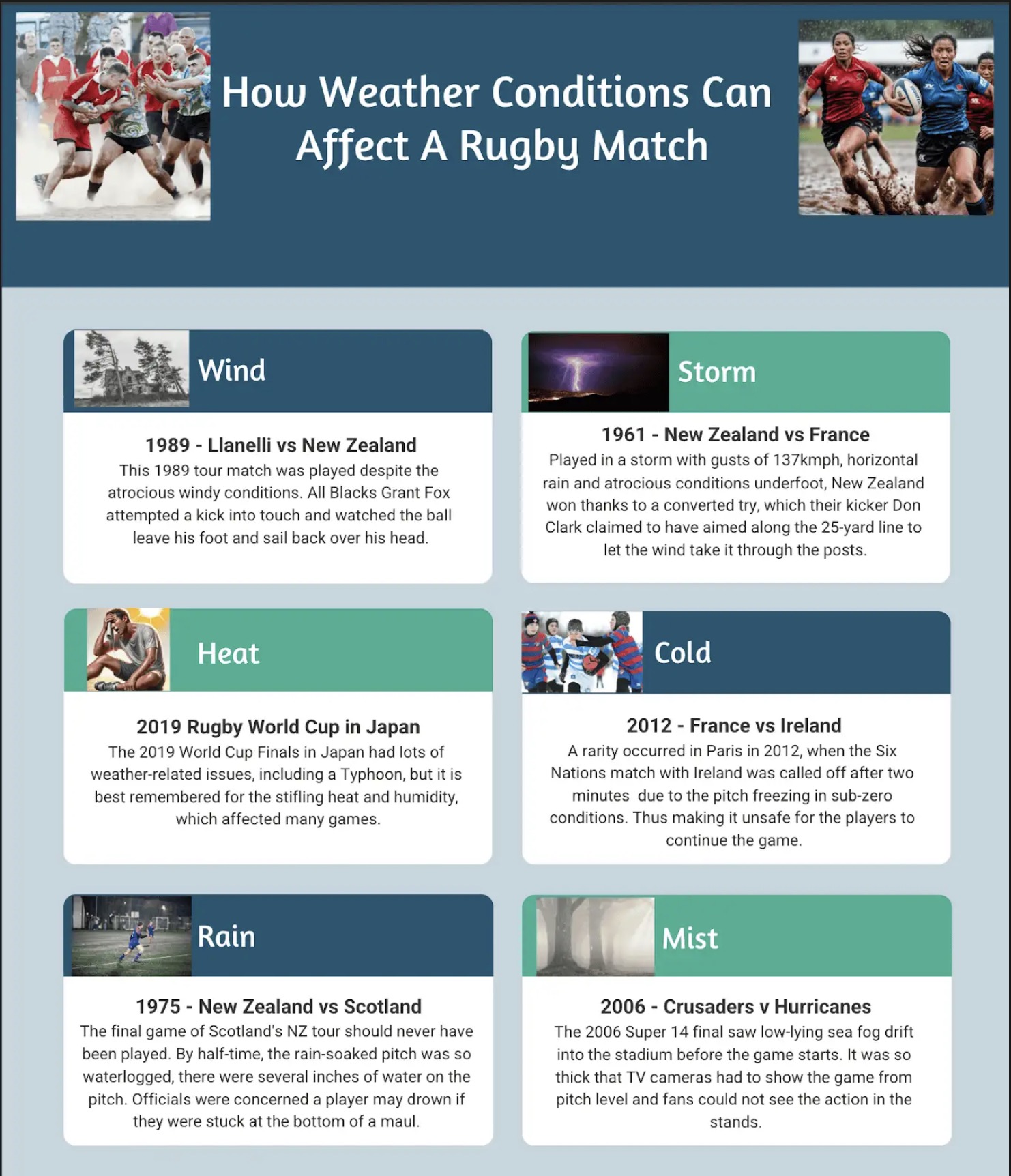How Weather Conditions Can Affect A Rugby Match
Nothing can disrupt a rugby match more than weather conditions.
While it is rare for rugby matches to be postponed due to meteorological issues, the weather can and does greatly influence what occurs on the pitch.
While Rugby fixtures tend to be played in all kinds of weather, that doesn’t mean that games will be played in the same way regardless of the conditions.
In this post, we’ll explore how weather can be a key influence on how a match is played, the associated issues, dangers and problems facing players as they attempt to beat their opponent, and the conditions!
But first, check out our detailed infographic below, which lists six such matches and tournaments where the weather played a prominent role in what transpired.
Looking to place a bet on the next big match? Get your exclusive betting voucher here and start wagering today!
Wild Weather-Influenced Rugby Matches & Tournaments
Influence of environmental factors on matches in rugby history:

Rugby Weather-Related Impacts
In the examples above, you can see how various weather conditions greatly influenced different individual games and even one entire tournament.
Let’s dig a little more deeply into several different weather conditions and outline some of the ways in which this can influence how the game is played and also cause issues for the players, coaches and fans in attendance.
Mist/Fog
Main Impacts
-
Poor visibility for players, but more so for coaches and fans (and TV).
-
The kicking game can be impacted.
How much mist or fog affects a game of rugby depends on the thickness and visibility through the mist and fog and how long it lasts. The thicker the fog, the lower the visibility and the longer these conditions persist, the greater the effect on the game will be.
It is only in very extreme circumstances that fog can play a major role in a game of rugby. In most cases, even on misty days, players can see enough of each other and the field to play the game unaffected.
However, when visibility becomes so poor that players can barely see each other, the game can be greatly affected and even be called off on safety grounds by officials.
Wind
Main Impacts
-
Depending on wind direction, a strong wind can aid a team playing one way, and hinder the team playing into the win.
-
However, once a wind reaches storm force, it usually does not benefit either team.
-
Strong winds drastically influence the kicking game, conversions, line-outs and penalties.
-
Winds can also influence longer passes, making shorter passes preferable.
The speed of the wind affects a game of rugby a great deal once it starts to reach a steady 25-30 mph, and those changes are magnified as the wind speed increases.
Playing with the wind at your back used to be viewed as universally positive (hence the use of terms like “six-point wind” to describe the advantage of having the wind at your back. But experts now feel that playing with a severe wind at your backs helps neither team.
Furthermore, the wind can swirl and blow around in blustery conditions and a stadium environment rather than simply blowing in one direction for the entire game.
Strong winds wreak havoc with the kicking game. Kicking with the wind, teams can land penalties from the halfway line, while their opponents may struggle to get anything over the posts from inside the 22.
It can also influence line-outs, the kicking of conversions and penalties, leading teams to elect to kick far less during the match.
Rain
Main Impacts
-
Wet weather makes handling the ball more complex, leading to more knock-ons and drops of the ball, thus making passing more difficult.
-
Conditions can be very slippy underfoot or can turn the pitch into a muddy quagmire, making keeping balance tricky and reaching full pace difficult.
-
Rain makes the kicking game more attractive as it is harder to defend kicks by catching the ball and passing out from your own 22. It may also be easier to move the ball forward with a kick than by running and passing the ball.
-
In extreme cases, pitches can become waterlogged, and games called off due to the flooded playing surface.
In many cases, a little rain can be a benefit to the rugby player. It can keep the pitch watered and cool them down. However, when the rain gets heavy and persistent, it can soon become a problem.
Wet weather’s most significant effect on Rugby is in terms of ball handling. Passing, running with the ball, maintaining possession when tackled and so forth can be much more difficult when the ball is wet and slippery.
In extreme conditions, pitches can become unplayable as water sits on the playing surface, making the game even more challenging or unplayable.
Even in relatively benign rainy conditions, the pitch can become soaked and start to cut up, making keeping your footing tricky.
Storms
Main Impacts
-
All the problems of windy weather but potentially more extreme.
-
All the problems of rainy weather but potentially more extreme.
-
In warmer temperatures, there is a chance of thunder & lightning and even tornadoes.
-
In cooler conditions, the rain can turn into sleet & snow.
An incoming storm combines two of the worst weather elements, wind and rain and then adds other rogue elements to make a preeminent weather influence on any rugby match.
Imagining a game played in incredibly windy and rainy conditions makes all aspects of the game more difficult for both teams.
However, if the climate is generally warmer, you also run the risk of thunder and lightning, the latter of which is a real danger if it occurs within 50 miles or so of the stadium. Some of these storms can even spawn tornadoes.
Colder storms usually mean rain can turn into sleet or even snow, making conditions wintry underfoot, while the added cold also has its effects on the game (as we will see below).
It is fair to say that a bad storm is at the top of the list of all weather conditions that can negatively influence a game of rugby.
Cold
Main Impacts
-
The pitch can freeze over, or be much harder than in warmer weather.
-
The ball is much colder, harder and more difficult to handle for players.
-
Players hands will be colder and that makes catching, passing and holding onto the ball more difficult.
-
Cold conditions can lead to snow, slush or ice on the pitch, making underfoot conditions tricky
Cold usually does not influence whether a game can take place, provided that the pitch is safe to play on (and not frozen solid). However, it still notably affects a game when the conditions are bitterly chilly.
Handling is much more difficult as the player’s hands are cold, while the ball is much colder, making it less malleable and more difficult to catch, pass or run with.
The other main complication of cold weather is the likes of sleet, ice and snow, all of which can affect conditions underfoot and in very snowy conditions, players' visibility.
Heat
Main Impacts
-
The pitch will likely be much drier, even if watered before the match.
-
Players are at risk of sunburn, heat exhaustion, and heat stroke and need to take on far more fluids during a game. These conditions are exacerbated further if high temperatures are combined with high humidity.
-
Heat can make players tire more quickly and lose body mass through sweating. As such, substitutions may be made earlier and/or more frequently.
Heat can drastically affect a rugby game, especially during humid conditions. Heat not only dries out the pitch, but it has a far more telling effect on players.
Players sweat more, and as it evaporates, it cools the body. However, in high heat/high humidity conditions, sweat may not evaporate from the body as the air around it is already moist.
This can lead to players suffering from heat-related conditions, such as heat exhaustion or heat stroke. These can be incredibly dangerous to the individual.
Rugby’s World Governing Body is now looking at ways to mitigate the effects of heat on games by introducing several measures, such as frequent drink breaks and an extended half-time period, for games played in testing heat.
So remember, if you are going to watch a rugby game or even have a wager on it, then always consider just how much impact the weather will have on the match!
Article written by
Ian John
Sports Writer and Reviewer
BonusCodePoker



